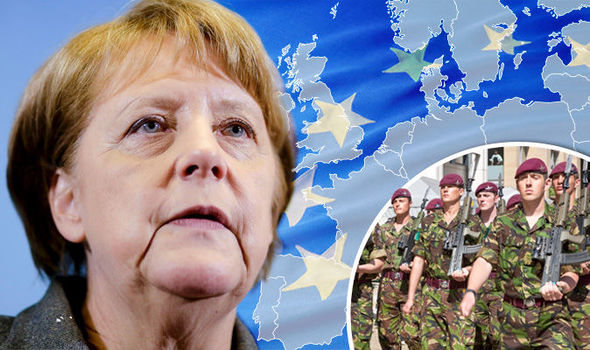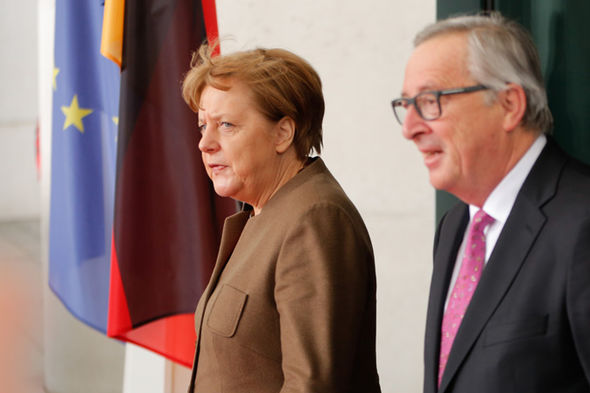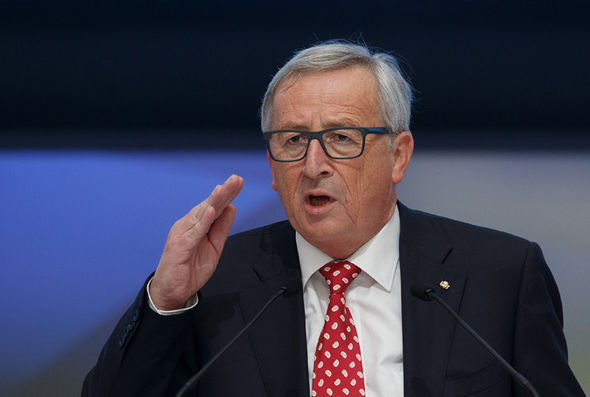German plot to keep EU army a SECRET till June 23 EXPOSED as plans drawn up in Berlin

BRITISH Brexit campaigners have been boosted with news from Berlin that Germany is once more pushing for an EU army encompassing all 28 member states with a joint HQ and shared military planning.
Along with judicial, tax and immigration issues, a Euro army has for long been one of the main irritants of anti-EU campaigners.
The fact that Germany — the powerhouse of the project — is mooting one so close to the referendum on whether Britain stays or goes is seen as madness by politicians fighting to keep the UK within the group.
Now a white paper has been drawn up by Berlin.
Media reports suggest that the Germans wanted to keep its proposals secret until after the June 23 plebiscite but it has now been leaked.
The paper outlines steps to "gradually co-ordinate Europe's patchwork of national militaries and launch permanent cooperation under common structures among the member states."
The initiatives proposed includes strengthening cyberwarfare abilities and relaxing Germany's self-imposed restrictions about deploying troops in peacetime within the country. This was brought in after 1945 when Nazism was crushed and Germans turned away from militarism.
The draft proposal seeks to end the ban noting the "character and dynamic of current and future security-political threats." This includes deep-rooted fears in Germany that it could suffer a Paris-style terror strike any time soon.
"German security policy has relevance — also for beyond our country. Germany is willing to join early, decisively and substantially as a driving force in international debates … to take responsibility and assume leadership," the white paper says.
Colonel Richard Kemp, who formerly worked on the Joint Intelligence Committee, which advises the British Government on issues of national security, warned recently that Brussels' "ultimate plan" was to bring the national armies of the bloc's member states under one command.
The idea resurfaced last year when European Commission President Jean-Claude Juncker called for an international force. The Berlin project will see the construction of a joint civil military headquarters for tEU operations, a council of defence ministers and better production and sharing of military equipment.
Of the Nato alliance the document read; "The more we Europeans are ready to take on a greater share of the common burden and the more our American partner is prepared to go along the road of common decision-making, the further the transatlantic security partnership will develop greater intensity and richer results." .
Roderich Kiesewetter, a Bundestag foreign affairs committeee member wrote in a recent paper: "The creation of a European army is a long way off, but it is a strategic necessity to implement important steps to pave the way towards it now."
Juncker was backed by leading German politician’s last year when he said a “euro-army” commanded by Brussels would provide a “more credible” response to threats, including from Russia and the Isis terror group.
"Such an army would help us to build a common foreign and security policy, as well as jointly assume the responsibilities of Europe in the world.
“Europe’s image has suffered dramatically and also in terms of foreign policy, we don’t seem to be taken entirely seriously,” he added.
Such a force could, he went on, could “react credibly” to dangers facing the EU’s 28 member states or its neighbours.
Moscow’s suspicions of such a move will be compounded by Juncker’s specific statement that forming such a body would make clear to Russia that the EU is “serious about upholding the value of the European Union”.
Juncker insisted the force would not be in competition with Nato, the 28-member alliance which includes most but not all EU countries and which the UK views as the bedrock of western defence cooperation.
“Rather a European army would bring an intensive cooperation in the development and the purchase of military equipment and bring substantial savings,” he added.
Политика конфиденциальности | Правила пользования сайтом











